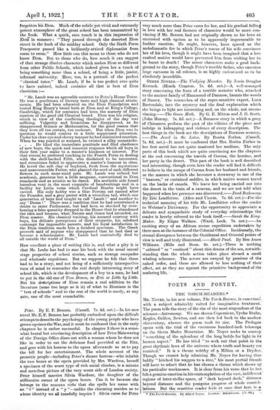Peter. By E. F. Benson. (Cassell. 7s. 6d. net.)—In his
new novel Mr. E. F. Benson has probably embarked upon the difficult attempt to describethe psychology of the young people who have grown up since the War, and it must be confessed that in the early chapters he is rather successful. In chapter 3 there is a some- what brutal but convincing description of how Peter Mainwaring of the Foreign Office dines out with a woman whom he does not like in order to eat the delicious food provided at the Ritz, and goes with his hostess to the opera afterwards so as to pay the bill for her entertainment. The whole account of the parasitic people—including Peter's dinner hostess—who inhabit the two boxes at the opera provided by Mrs. Wardour, herself a specimen of the worst type of rich social climber, is a minute and merciless picture of the very worst side of London society. Peter himself marries Silvia Wardour, the daughter of the millionaire owner of the opera boxes. Can it be because she belongs to the nouveau riche that she spells her name with an "-.1 " instead of a " y "—unlike the charming maiden as to whose identity we all tunefully inquire ? Silvia cares fer Peter very much more than Peter cares for her, and his gradual falling in love with her real fineness of character would be more con: vineing if Mr. Benson had not originally shown. us his hero so, encrusted with egoism as to be apparently impermeable to further emotion. Ho might, however, have spared us the melodramatic fire in which Peter's rescue of his wife convinces her of his love, though it might have been imagined that a less exalted motive would have prevented him from wishing her to be burnt to death ! The minor characters make a good back- ground to the story, though Peter's terrible father, who executes large cartoons in oil colours, is so highly caricatured as to be absolutely incredible.


































 Previous page
Previous page